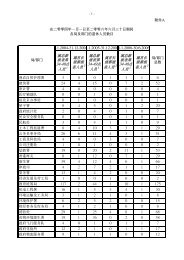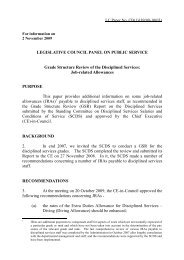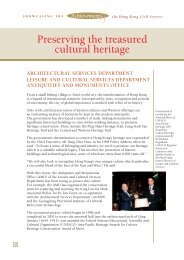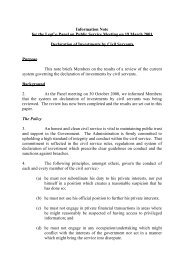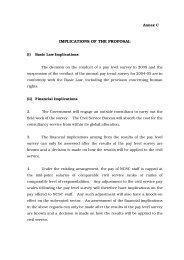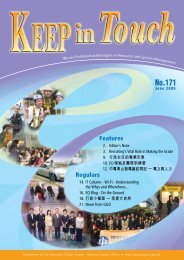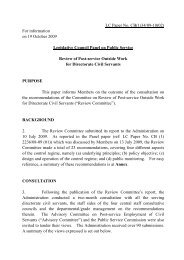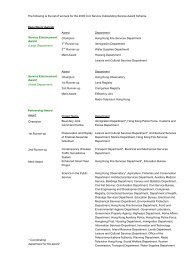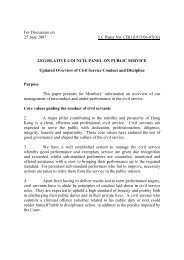Interview with Mr Patrick Chan, BBS, JP Director of ... - å ¬åå¡äºåå±
Interview with Mr Patrick Chan, BBS, JP Director of ... - å ¬åå¡äºåå±
Interview with Mr Patrick Chan, BBS, JP Director of ... - å ¬åå¡äºåå±
- No tags were found...
Create successful ePaper yourself
Turn your PDF publications into a flip-book with our unique Google optimized e-Paper software.
EO BLOGMain Page Management Articles Guest Book FoldersTangible Gifts showing appreciation topeople at work by rewarding them <strong>with</strong> gifts.The most important thing is to find the rightkind <strong>of</strong> gift for them, as giving an arbitrary gift<strong>with</strong> no meaning can actually have a negativeeffect. It is better for you to take time andnotice what your colleagues enjoy, observingtheir hobbies and interests so that you can buythem a small and appropriate gift.Physical Touch giving a pat on the back,a handshake or even a “high five” for a jobwell done. Usually, physical touch occursspontaneously and in the context <strong>of</strong> celebration.In order that this language <strong>of</strong> appreciationcan be seen as a meaningful expression <strong>of</strong>appreciation we have to observe the norm <strong>of</strong>a particular culture. The norm on whether thephysical touch is considered as appropriateor inappropriate touches between members<strong>of</strong> the opposite sex or same sex.The book also highlights the fact that for each <strong>of</strong>us there is a primary and secondary language<strong>of</strong> appreciation and a least valued language<strong>of</strong> appreciation. Our primary language wouldcommunicate more deeply from our hearts;the second language comes from a secondaryplace, while the least valued language is theleast meaningful to us. There is an assessmenttool called the Motivating by Appreciation (MBA)Inventory which helps individual employeesdiscover their primary appreciation language,their secondary language and the language thatis least meaningful to them.A person’s preferred language <strong>of</strong> appreciationwill change over time in response to differentstages, circumstances or events in life and theindividuals <strong>with</strong> whom they are interacting. Underthe influence <strong>of</strong> these factors, one’s secondarylanguage <strong>of</strong> appreciation may ascend the ladder<strong>of</strong> importance and one’s primary language maytend to decrease in emotional value. There mayalso be situations in which one’s least importantlanguage may become meaningful.It is important for us to discern the language <strong>of</strong>appreciation people value most and speak thatlanguage to the person you are trying to encourageso you do not miss the mark. The two most concreteways to discern the language <strong>of</strong> appreciation is t<strong>of</strong>ind out how they show appreciation to others andwhat they complain about.As civil servants, we have lists <strong>of</strong> duties andresponsibilities which are specific to the posts weare holding, and most jobs are inter-related in ourworkplace. We should be careful in performingthe acts <strong>of</strong> service in such a way that you arenot seen as simply shirking your responsibilities.When we are showing appreciation by usingthe languages <strong>of</strong> tangible gifts, we have to becareful not to be perceived as having possibleconflicts <strong>of</strong> interests, accepting an advantage orbreaking anti-corruption laws. In relation to anact <strong>of</strong> physical touch, we have to be cautiousto avoid the incident being construed as sexualharassment.I highly recommend this book because it providesdeep insights into the different considerationswe must have when showing appreciation forour colleagues in order to create a positive andproductive work atmosphere. A positive workingrelationship is extremely important, especiallywhen we are <strong>of</strong>ten asked to “do more <strong>with</strong> less”.Last but not least, knowing the tips and skillsto show appreciation for other’s work is notenough. We have to constantly put these intopractice to recognise their real effects.If you are interested in the book, please go tohttp://appreciationatwork.com.Alice Chu19





